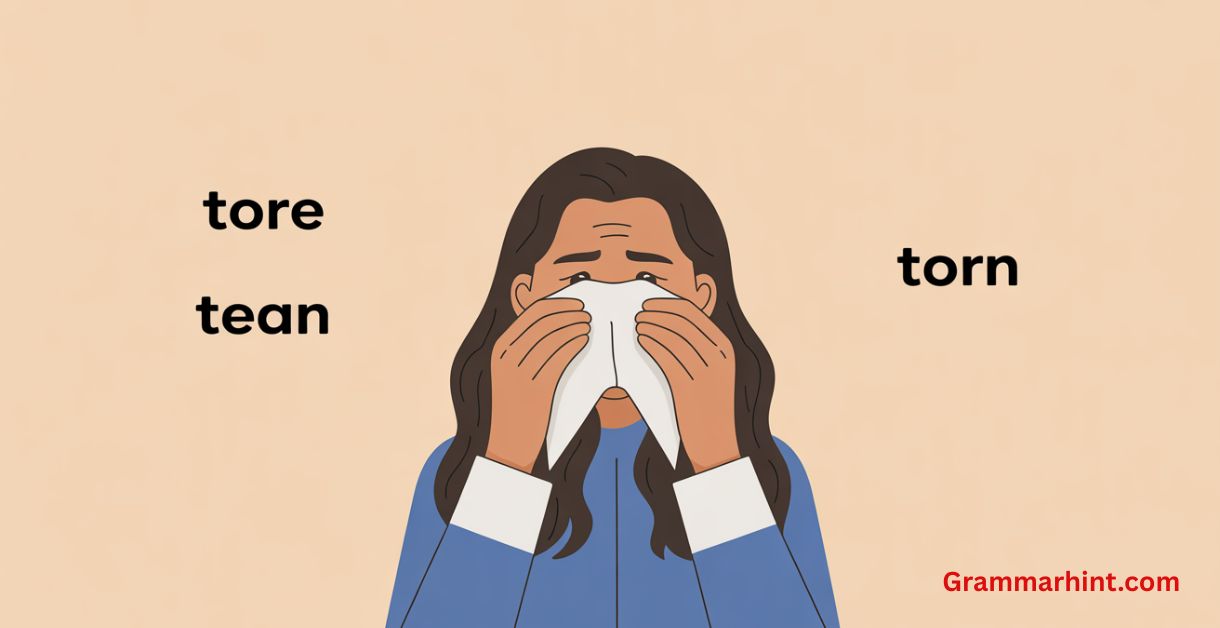English is full of quirks, and the verb tear is no exception. If you’ve ever paused to ask, what is the past tense of tear? you’re not alone.
This simple-looking verb has caused plenty of confusion over which form to use: tore, teared, or torn. The answer depends on the context, meaning, and grammar rules.
Let’s unpack the mystery around the tear past tense, dive into examples, and clear up common mistakes once and for all.
Understanding “Tear” as a Homograph: Crying vs. Ripping
Before we talk about the past form of tear, it’s essential to recognize that tear is a homograph a word spelled the same but with different meanings and pronunciations.
- When tear means to rip or pull apart something, it’s pronounced like “tare” (/tɛər/).
- When tear means to cry (like the drops from your eyes), it’s pronounced like “teer” (/tɪər/).
This distinction leads to differences in the tear verb past tense forms and how you use them in sentences.
The Irregular Verb Tear: Tore, Torn, or Teared?

English verbs can be regular or irregular. Regular verbs add -ed to form the past tense, like walk → walked. However, tear (to rip) is irregular.
Here’s a quick look:
| Verb Meaning | Present | Past Tense | Past Participle |
|---|---|---|---|
| To rip (tear) | tear | tore | torn |
| To cry (tear) | tear | teared | teared |
- Tore is the past tense of tear when you mean ripping.
- Torn is the past participle of tear used in perfect tenses or passive voice.
- Teared is the regular past tense and past participle for tear meaning cry.
Which One’s Correct for Ripping?
If you’re talking about something being ripped or shredded, the correct past tense of tear is tore.
Example:
Yesterday, I tore my favorite shirt while moving furniture.
This sentence shows the past form of tear as tore, describing a physical ripping event.
Which One’s Correct for Crying?
When you use tear to mean crying, it’s usually regular in past tense, so you add -ed: teared.
Example:
After watching the sad movie, Sarah teared up and wiped her eyes.
Here, teared describes the action of shedding tears, not ripping anything.
What About Torn?
You often see torn in sentences like:
The letter was torn into pieces.
This is the past participle of tear (rip meaning), commonly used with auxiliary verbs like have, had, been, or in passive voice. It can’t stand alone as a simple past tense verb.
Grammar Deep Dive: Irregular Verbs & Past Participle
Understanding tear grammar means knowing the difference between past tense and past participle.
- The past tense (simple past) describes an action completed in the past — I tore the paper.
- The past participle works with helping verbs — I have torn the paper, or The paper was torn.
Since tear (rip) is irregular, the past participle form is not just tore with -ed added but torn.
Pronunciation & Phonology
The two meanings of tear also differ in pronunciation, which can affect how native speakers interpret the sentence:
- Tear (rip): /tɛər/ (rhymes with “care”)
- Tear (cry): /tɪər/ (rhymes with “fear”)
When conjugated:
- Tore: /tɔr/ (rhymes with “more”)
- Torn: /tɔrn/ (rhymes with “born”)
- Teared: /tɪərd/ (rhymes with “feared”)
Active vs. Passive Voice with Tear
You can use tear in both active and passive voices:
- Active:
John tore the envelope open.
Here, John does the action. - Passive:
The envelope was torn open by John.
The action happens to the envelope.
Note: For passive voice, use torn (past participle), never tore or teared.
Usage Examples & Scenarios
Email Example: Torn vs Tore vs Teared
Imagine you’re emailing a colleague about a damaged report.
Subject: Damaged Report
Hi Lisa,
I wanted to let you know that I accidentally tore a page in the report while printing it. The page looks torn, but the content is still readable.
Sorry for the inconvenience!
Best,
Mark
Now, suppose you’re writing a message about feeling emotional during a farewell party:
Subject: Farewell Party
Hey Mike,
Honestly, I teared up during your speech yesterday. It was so touching!
Hope to catch up soon.
Cheers,
Anna
These emails show how tear past tense varies by context.
Common Mistakes and How to Avoid Them
A lot of people mix up tore, torn, and teared because they sound similar and come from the same root.
- Don’t say: I torn the paper yesterday.
- Instead: I tore the paper yesterday.
- Don’t say: She tore up after the movie. (If you mean crying)
- Instead: She teared up after the movie.
- Use torn only with perfect tenses or passive voice:
The fabric has been torn.
Etymology of “tear” (Rip) vs. “tear” (Cry)
Interestingly, the two meanings of tear come from different roots:
- Tear (rip) comes from Old English teran, meaning “to tear or rend.”
- Tear (cry) derives from Old English tēar, meaning “a drop of liquid from the eye.”
Despite identical spelling, these verbs evolved separately, which explains their different conjugations and pronunciations.
Synonym Sets: Rip, Shred, Lacerate vs. Cry, Weep, Sob
Knowing synonyms helps clarify meaning:
- For tear (rip): rip, shred, lacerate, split
- For tear (cry): cry, weep, sob, blubber
Colloquial Phrases & Idioms with Tear
“Tear” appears in many idioms:
- Tear up – to start crying: She tore up when she heard the news.
- Tear apart – to destroy or criticize: The critics tore apart the movie.
- Tear down – to demolish: They tore down the old building.
- Tear at one’s heart – to cause emotional pain.
Tips for Remembering the Conjugations
- If you’re talking about ripping: use tore (past), torn (past participle).
- If you mean crying: use teared for both past and past participle.
- Think of pronunciation: “tare” = rip, “teer” = cry.
Summary Table: Past, Present, Future Forms of Tear
| Tense | Tear (Rip) | Tear (Cry) |
|---|---|---|
| Present | tear | tear |
| Past | tore | teared |
| Past participle | torn | teared |
| Future | will tear | will tear |
Final Takeaway
To wrap it up, the past tense of tear depends on meaning. If you’re talking about ripping, “tore” is your go-to simple past, and “torn” is the past participle. For crying, use “teared”. Keep the pronunciation and context in mind to avoid mistakes.
So next time you ask yourself, what is the past tense of tear? remember this: rip → tore/torn; cry → teared. Easy as that!









